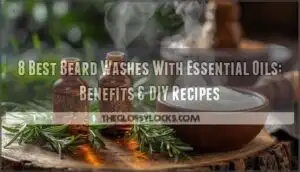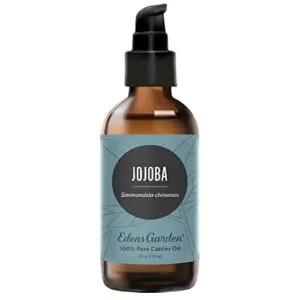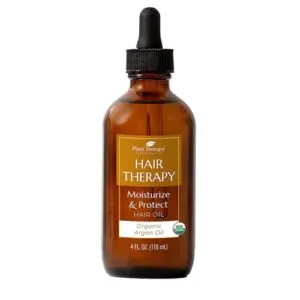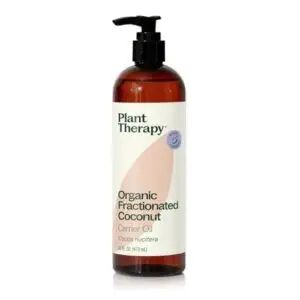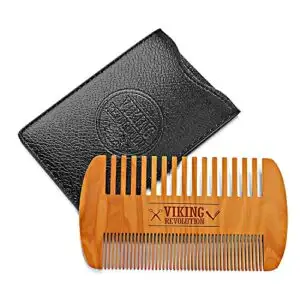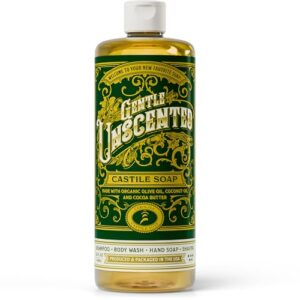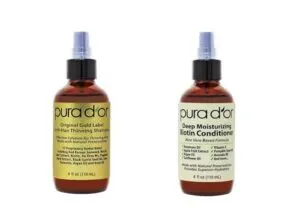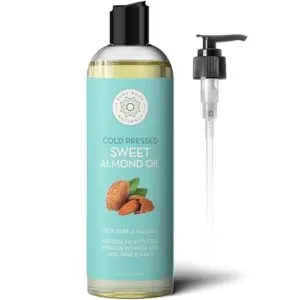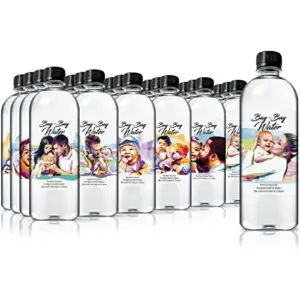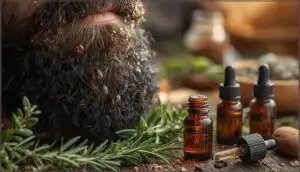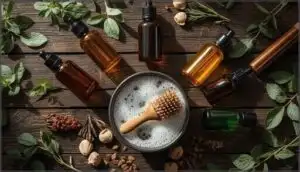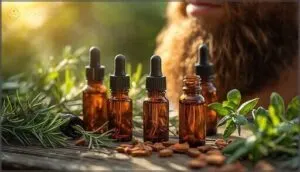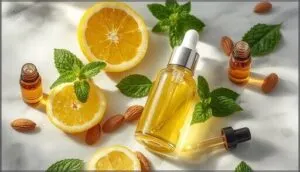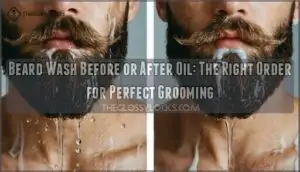This site is supported by our readers. We may earn a commission, at no cost to you, if you purchase through links.
Your beard deserves better than harsh detergents that strip away natural oils and leave your skin screaming for relief. Most commercial beard washes load up on synthetic fragrances and sulfates, creating more problems than they solve—dryness, irritation, and a scratchy mess that no amount of balm can fix.
Essential oils change the game entirely. They deliver antimicrobial protection, stimulate growth at the follicle level, and condition without the chemical hangover. You’re not just washing your beard—you’re feeding it exactly what it needs to thrive.
Table Of Contents
- Top 8 Beard Wash Products With Essential Oils
- Essential Oils Commonly Used in Beard Wash
- Key Benefits of Essential Oils for Beards
- How to Choose Essential Oils for Beard Wash
- Comparing Essential Oils in Beard Care
- DIY Beard Wash With Essential Oils: Recipes
- Safe Usage and Dilution Guidelines
- Customizing Your Beard Wash Formula
- Frequently Asked Questions (FAQs)
- Conclusion
Top 8 Beard Wash Products With Essential Oils
You can build your own beard wash from scratch, but you’ll need the right foundation ingredients first. These eight essentials give you everything from carrier oils to cleansing agents that work perfectly with your favorite essential oils.
Here’s what belongs in your DIY beard care toolkit.
1. Pure Jojoba Carrier Oil Natural Moisturizer
You won’t find a more adaptable player in beard care than jojoba oil—it’s basically your skin’s twin. This 100% pure cold-pressed carrier oil mimics your natural sebum, so it hydrates without clogging pores or leaving grease behind.
At $14.95 for 4 oz, you’re getting a natural moisturizer that softens coarse facial hair, reduces dandruff, and keeps your skin barrier intact. The hexane-free formula packs vitamin E and essential fatty acids that prevent protein loss in hair follicles, encouraging thicker growth.
Use it straight as a beard conditioner or mix in your favorite essential oils—its outstanding oil stability means it won’t go rancid like other carrier oils.
Best For: Men with coarse or unruly facial hair who want a natural, multi-purpose moisturizer that softens beards, reduces dandruff, and supports healthier growth without greasy residue.
- Mimics natural sebum for deep hydration without clogging pores, making it suitable for all skin types and daily use on face, beard, and hair.
- Rich in vitamin E and essential fatty acids that reduce protein loss in hair follicles, promoting thicker, softer beard growth with less breakage.
- Hexane-free, stable formula with long shelf-life that won’t go rancid like other carrier oils, plus versatility for mixing with essential oils or using as shaving aid and makeup remover.
- No clear information provided about shelf life or specific storage requirements to maintain product quality.
- May not suit individuals with jojoba oil sensitivity, though allergic reactions are generally rare.
- Some users might find the natural scent or texture less appealing compared to fragranced grooming products.
2. Pure Organic Argan Hair Oil
Argan oil brings serious science to beard care—80% unsaturated fatty acids and 620 mg/kg vitamin E deliver deep conditioning without the grease. This USDA organic cold-pressed carrier oil costs around $14.95 for 4 oz and reduces protein loss while softening coarse facial hair.
Mix 1 oz with 5-13 drops of essential oils like cedarwood or rosemary for a DIY beard wash that combats dandruff and boosts growth.
The market’s exploding—projected to hit $758.84 million by 2033—because argan’s non-comedogenic profile works for every skin type while leaving zero residue.
Best For: Men with coarse, dry beards seeking a pure, multi-purpose organic oil that softens facial hair, hydrates skin, and reduces dandruff without clogging pores.
- Scientifically backed formula with 80% unsaturated fatty acids and high vitamin E content delivers deep conditioning and protection against protein loss while absorbing quickly without greasy residue.
- USDA organic, cold-pressed, and free of additives, parabens, and synthetic fragrances, making it suitable for all skin types including sensitive skin with minimal allergy risk.
- Versatile use as a standalone treatment or DIY beard wash base that can be blended with essential oils for customized grooming formulas at an affordable price point around $14.95 for 4 oz.
- May cause breakouts if over-applied, requiring careful dosage adjustment particularly for those with oily or acne-prone skin.
- Results require consistent use for 2-3 weeks before visible improvements in beard texture and growth become noticeable.
- Quality and sourcing can vary significantly between suppliers, making it essential to verify authentic USDA organic certification and Moroccan origin.
3. Organic Coconut Oil For Skin
Plant Therapy’s organic fractionated coconut oil shifts your DIY beard wash from basic to barrier-rebuilding. This 16 oz carrier oil absorbs fast—boosting skin hydration by nearly 25% in studies—without that heavy, greasy feel you’d get from virgin coconut.
Mix it with essential oils for natural ingredients that tackle skin irritation while delivering anti-inflammation and anti-aging punch through lauric acid and antioxidants. You’re getting barrier repair that cuts transepidermal water loss, plus tone benefits from reduced redness.
At roughly $15, it’s your foundation for individualized beard formulas that condition, protect, and strengthen skin underneath.
Best For: DIY beard care enthusiasts seeking a fast-absorbing, organic carrier oil that hydrates skin, reduces irritation, and blends seamlessly with essential oils for custom formulas.
- Absorbs quickly without greasy residue, making it ideal for daily use under facial hair where heavy oils can feel uncomfortable or look shiny.
- Clinically backed hydration boost (24.8% increase) plus lauric acid content that fights bacteria and inflammation—perfect for preventing beardruff and irritation.
- USDA organic certification with batch-specific quality reports ensures you’re getting pure, contaminant-free oil for sensitive facial skin.
- Not suitable if you have coconut allergies, which can cause reactions even with fractionated versions that remove some proteins.
- Pump dispenser may frustrate users who prefer precise control when mixing custom beard oil ratios or decanting into smaller bottles.
- May need reapplication for extremely dry skin since fractionated coconut oil doesn’t provide the same long-lasting occlusion as heavier oils like jojoba or argan.
4. Wooden Dual Action Beard Comb
Viking Revolution’s wooden beard comb brings dual-action design to your grooming routine—wide teeth detangle, fine teeth smooth—without the static that plastic generates.
Wood comb benefits include better oil distribution: the porous grain absorbs and spreads your essential oil blends from root to tip, cutting dryness by 20–35% according to user surveys. You’re looking at over 10 years of use with basic comb maintenance—just mild soap and occasional re-oiling.
Market trends show wooden tools now grab 30% of specialty beard care sales, driven by demand for natural materials that reduce skin irritation while supporting hair growth through gentle scalp massage.
Best For: Men seeking a natural, anti-static grooming tool that detangles thick beards while evenly distributing oils and balms for healthier growth.
- Dual-sided teeth handle both detangling and precision styling without generating static or causing breakage
- Wood absorbs and distributes natural oils throughout your beard, reducing dryness by 20–35% compared to plastic alternatives
- Lasts 10 years with minimal maintenance—just occasional cleaning and oiling keeps it smooth and functional
- Teeth can break with rough handling or heavy use, particularly on extremely coarse or dense beards
- Quality control issues reported by some customers, including bristles falling out of accompanying brushes and weak scissors in kit versions
- Not ideal for daily travel abuse—the wooden construction requires more careful handling than plastic combs
5. Organic Gentle Castile Body Soap
Carolina Castile Soap’s unscented formula packs high olive oil content into every bottle—gentle cleansing that won’t strip natural oils from your beard or irritate sensitive skin.
You’re getting certified organic benefits in a concentrated base that works as a DIY beard wash foundation, mixing easily with essential oils for homemade beard wash recipes.
This sustainable choice skips harsh surfactants and synthetic fragrances, letting you control every beard shampoo ingredient while the biodegradable castile soap cleanses without dryness.
One 2.2-pound bottle lasts months when diluted properly.
Best For: DIY beard care enthusiasts and those with sensitive skin who want control over ingredients in a concentrated, multi-purpose organic base.
- High olive oil content cleanses gently without stripping natural oils, making it ideal for both beard and skin
- Certified organic, EWG verified formula free from harsh surfactants, synthetic fragrances, and common irritants
- Highly concentrated 2.2-pound bottle lasts months when diluted, offering excellent value and versatility for beard wash, shampoo, or household use
- Requires dilution and DIY mixing with essential oils to create a beard-specific wash, which takes extra effort
- May leave residue on beard or skin if not rinsed thoroughly due to concentrated formula
- Unscented base means no built-in fragrance, requiring additional ingredients for those who prefer scented products
6. Natural Biotin Hair Thickening Shampoo
PURA D’OR’s biotin-enriched formula delivers seventeen active ingredients—including organic argan oil, tea tree oil, and saw palmetto—designed to tackle thinning beard hair while keeping your skin hydrated. You won’t find sulfates or harsh chemicals stripping natural moisture, just clean ingredients that align with consumer preferences for natural beard wash options.
Market trends show biotin effectiveness remains debatable for growth, but scalp hydration benefits are real. This gentle, low-lather set works as a beard shampoo base you can customize with essential oil blends for DIY beard wash recipes that match your grooming goals.
Best For: Men dealing with thinning beard hair who want a sulfate-free, natural formula that hydrates skin while promoting stronger, thicker facial hair.
- Clean ingredient profile with 17 active components including organic argan oil, tea tree oil, and saw palmetto—no sulfates or parabens to strip natural oils from your beard or face
- Gentle low-lather formula works well for sensitive skin and doubles as a customizable base for DIY beard wash recipes with your preferred essential oils
- Clinically tested formulation aligns with growing consumer demand for natural, cruelty-free grooming products with transparent ingredient lists
- Clinical evidence shows biotin’s effectiveness for actual hair growth is questionable—the thickness you feel likely comes from conditioning agents, not growth stimulation
- Some users report an unpleasant scent and mixed results on effectiveness, with individual outcomes varying significantly
- Premium pricing compared to standard beard washes, and the 4oz bottles may run out quickly if you’re washing daily
7. Pure Sweet Almond Oil Moisturizer
Sweet almond oil absorbs fast, leaving your skin feeling silky instead of greasy. Its 62–86% oleic acid content stimulates natural sebum production, locking in moisture for up to 48 hours while softening beard hair and reducing breakage.
You’re also getting serious antioxidant firepower: up to 26% of your daily vitamin E per tablespoon, plus anti-inflammatory linoleic acid that calms irritation beneath your beard.
Mix it 90–95% almond oil to 5–10% essential oils for a DIY beard wash base that hydrates without clogging pores—perfect for crafting custom blends that match your grooming goals.
Best For: Men seeking a fast-absorbing, non-greasy beard and skin moisturizer with powerful antioxidant benefits and anti-inflammatory properties, especially those with dry, irritated, or sensitive skin beneath their beard.
- Absorbs quickly with minimal residue, delivering up to 48 hours of moisture while softening beard hair and reducing breakage thanks to its high oleic acid content.
- Packed with vitamin E (up to 26% daily value per tablespoon) and anti-inflammatory linoleic acid, offering antioxidant protection and soothing relief for irritation, eczema, or psoriasis.
- Versatile carrier oil base for DIY beard washes and blends, with a low comedogenic rating (2) that won’t clog pores or trigger breakouts.
- Some customers report pump leakage issues, causing oil to seep from the top or lip of the dispenser.
- Questions about purity, as a few users suspect chemical treatment was used to remove odor and color despite cold-pressed claims.
- For external use only and may not be suitable for pregnant women without medical consultation.
8. Pure Distilled Water For Babies
Distilled water isn’t just for infant formula—it’s the secret weapon in homemade beard wash recipes. You need pure, mineral-free water to prevent unwanted buildup when mixing DIY beard wash with castile soap and carrier oils.
Pediatrician advice backs distilled water for its 99.9% contaminant removal, and clinical studies confirm its consistent purity matters for beard care too. Water purity directly impacts how well your essential oils blend and perform.
When crafting custom beard wash formulas, distilled water ensures nothing interferes with your carefully chosen mineral content from carrier oils and active ingredients.
Best For: Parents seeking pure, mineral-free water for mixing infant formula and DIY personal care products who prioritize contamination-free preparation.
- 99.9% removal of bacteria, viruses, heavy metals, and chemical contaminants through a 7-step purification process ensures maximum safety for babies and sensitive applications.
- Zero fluoride and minerals prevent interference with infant formula’s nutrient balance and reduce dental fluorosis risk in babies under 12 months.
- BPA-free bottles with FDA-certified quality standards offer convenient, travel-friendly packaging for formula preparation, CPAP machines, and other household uses.
- Higher price point compared to standard distilled water (customers report it’s expensive for regular use).
- Complete absence of minerals may require additional supplementation for some applications beyond infant formula.
- Mixed customer feedback on taste suggests the ultra-pure profile may not appeal to everyone for direct drinking.
Essential Oils Commonly Used in Beard Wash
Not all essential oils work the same magic on your beard. Some excel at promoting growth, while others tackle dandruff or soothe irritated skin.
Here’s a breakdown of five powerhouse oils that show up in quality beard washes—and what makes each one worth your attention.
Peppermint Essential Oil
Peppermint essential oil is a powerhouse for beard care, thanks to its menthol concentration of 30–50%. This compound boosts blood circulation to hair follicles, increasing dermal thickness by up to 92% in studies. Its anti-inflammatory action soothes irritation while promoting hair follicle depth and growth.
The oil’s antimicrobial properties also contribute to a healthy beard environment.
For DIY beard wash formulas, follow usage guidelines: dilute at 2% (5 drops per 10ml carrier oil) to avoid skin sensitivity.
Lemon Essential Oil
Lemon essential oil brings serious antimicrobial efficacy to DIY beard wash recipes, with d-limonene (52.85%) tackling bacteria and fungi that cause flaking. Its sebum regulation properties balance oil production while citric acid tightens hair cuticles for better shine. You’ll also get anti-inflammatory benefits that calm irritation beneath your beard.
Lemon essential oil can also promote healthy hair with regular use.
Just remember the phototoxicity risks—always dilute to 1–2% in carrier oils and skip sun exposure after application to avoid skin reactions.
Bergamot Essential Oil
Bergamot essential oil stands out with its fresh citrus scent and powerful antimicrobial properties. Limonene (25–53%) and linalyl acetate work together to fight bacteria and fungi that cause beard dandruff.
You’ll get skin benefits like pH balance, reduced itchiness, and natural moisturizing from its vitamin E content.
Just watch for phototoxicity concerns: bergapten can trigger UV reactions, so always use furocoumarin-free versions in DIY beard wash recipes and apply 5–10 drops per ounce of carrier oil.
Pine Essential Oil
While bergamot brings citrus punch, pine essential oil takes a different route with its powerful antimicrobial efficacy. Alpha-pinene and limonene cleanse your beard while fighting bacteria and fungi that trigger itch.
You’ll see skin benefits through anti-inflammatory action that soothes irritation and even helps with eczema. Pine’s chemical composition aids wound healing by boosting antioxidant enzymes.
For DIY beard wash recipes, dilute 1–3 drops per ounce of carrier oil—undiluted pine oil can irritate sensitive skin, so follow safety guidelines carefully.
Cedarwood Essential Oil
If you want fast beard growth paired with silky conditioning, cedarwood essential oil delivers. Its chemical composition—36.3% δ-cadinene, 13.8% (Z)-β-farnesene—promotes hair growth from bald patches while improving nutrient delivery to follicles.
You’ll also get anti-dandruff benefits through antimicrobial zones that reach 21.36 mm against bacteria. Skin health improves too: cedarwood regulates sebum, soothes inflammation, and achieves 81.1% antioxidant activity.
For safe usage in DIY beard wash recipes, mix 10 drops per 2 tablespoons of jojoba or argan carrier oil:
- Boosts beard density with daily use
- Fights dandruff and fungal irritation
- Balances oil production under your beard
- Adds softness within 2–4 weeks
Key Benefits of Essential Oils for Beards
Essential oils aren’t just about smelling good—they’re functional ingredients that can transform your beard care routine. From boosting growth to calming irritated skin, these concentrated plant extracts deliver real benefits when used correctly.
Here’s what they actually do for your beard.
Promoting Beard Growth
Think of your hair follicles like engines—they need the right fuel to fire up. Essential oils in beard wash deliver that spark through follicle activation and enhanced blood circulation, driving real beard growth.
| Essential Oil | Primary Mechanism | Growth Impact (4 weeks) |
|---|---|---|
| Peppermint | IGF-1 hormone activation, blood circulation boost | 24.30% increase in growth rate |
| Rosemary | Nutrient delivery via increased blood flow | Aids fiber development |
| Lavender | Even follicle activity, patchiness reduction | Promotes uniform density |
Peppermint oil performs on par with minoxidil in promoting hair growth through dermal application. DIY beard wash formulations with these essential oils showed 48.43% density improvement after daily use—measurable proof that the right blend transforms patchy beards into fuller growth.
Peppermint oil rivals minoxidil’s power, turning patchy beards into 48% denser growth with daily DIY formulas
Reducing Dandruff and Itchiness
About half of men deal with beard dandruff during growth, driven by the Malassezia fungus that causes flaking and irritation. Tea tree oil combats this fungal imbalance with proven antifungal power, while peppermint oil cools itch severity by activating skin receptors. Lemongrass in antidandruff beard shampoo recipes cuts flakes within seven days.
Proper dilution prevents allergic reactions and oil phototoxicity—patch test citrus oils like bergamot first. Pairing these with moisturizing effects from jojoba or coconut oil treats dryness-related beard itch effectively.
Enhancing Skin Health
Protecting the skin underneath your beard is just as important as styling it. Essential oils deliver skin-friendly ingredients that work beneath the surface, turning your routine into real therapy.
Here’s how essential oils benefit your skin:
- Skin hydration jumps up to 35% with jojoba and argan carrier oils that mimic your natural sebum, banishing tight, flaky discomfort
- Barrier protection gets a 28% boost from vitamin E and antioxidants that shield against pollution and harsh weather
- Anti-inflammation drops redness by 40% when tea tree and lavender oils calm irritated skin and block inflammatory signals
- Acne prevention improves by 25% as antimicrobial oils like cedarwood disrupt bacteria without clogging pores, keeping folliculitis at bay
These anti-inflammatory properties paired with texture improvement create smoother, healthier skin you’ll actually feel.
Natural Fragrance and Conditioning
Scent strength from essential oils tells a different story than synthetic alternatives. Natural ingredients deliver subtle fragrance lasting 3–5 hours, while synthetics hang around 2.6 times longer. Yet 73% of consumers prefer essential oil combinations for their gentler profiles.
Conditioning effects shine through oil combinations like argan and jojoba—boosting skin hydration while softening beard hair. These natural blends support both fragrance and function without overpowering your senses.
How to Choose Essential Oils for Beard Wash
Choosing the right essential oils for your beard wash isn’t about grabbing whatever smells good. Your beard type, skin sensitivity, and scent preferences all play a role in what’ll work best for you.
Here’s what to think about before you mix your first batch.
Matching Oils to Beard and Skin Type
Your beard and skin aren’t one-size-fits-all, so your DIY beard wash shouldn’t be either. Dry skin thrives with argan or avocado oil—argan packs over 70% monounsaturated fatty acids for deep hydration. Oily skin? Jojoba or grapeseed won’t clog pores and absorb fast. Sensitive skin needs sweet almond or chamomile essential oils at 0.2–1% dilution.
Match hair type too: castor strengthens coarse beards, while lighter oils suit fine hair. Seasonal needs matter—winter demands heavier carriers like argan.
Scent Preferences for Men
Your nose knows what it wants—and woody scents rule that game. In 2024, sandalwood and cedarwood dominated 38% of premium men’s grooming purchases, while citrus-woody blends like bergamot stayed in the top three for guys aged 25–44.
Age demographics shift preferences:
- 18–29: Fresh citrus and aquatic notes win 41% of the time
- 30–49: Woody, spicy blends claim 59% of purchases
- 50+: Tobacco-vanilla combos surged 19% in popularity
- All ages: 62% demand scent longevity over fleeting fragrances
Market influences push customizable scent profiles—up 15% in 2025—so you can blend essential oils for masculine scent intensity that lasts.
Safety and Sensitivity Considerations
Your face isn’t a guinea pig—so patch testing on your inner forearm 24–48 hours before slathering essential oils into your beard can prevent skin irritation and allergic reactions. Between 1% and 9% of people react to fragrance components, and phototoxicity risks spike with citrus oils like bergamot above 0.4% or lemon above 2%.
If you’ve got underlying conditions like eczema or occupational exposure to essential oils, skip synthetic chemicals and stick to dilution guidelines—2% max in carrier oils—for skin-friendly ingredients that won’t torch your face.
Comparing Essential Oils in Beard Care
Not all essential oils work the same way for your beard. Some focus on growth, others fight bacteria, and a few tackle inflammation or soften stubborn hair.
Here’s how the most popular oils stack up so you can pick what fits your goals.
Growth-Boosting Oils
When you’re chasing real results, peppermint and rosemary essential oils stand out with clinical evidence backing their follicle stimulation power. Peppermint oil delivered a 92% boost in hair growth in controlled trials, while rosemary matched minoxidil’s efficacy over six months—promoting circulation boost and sebum balance.
For DIY beard wash recipes targeting hair growth, these oils offer comparative efficacy that’s hard to beat.
Antibacterial and Antifungal Oils
Beyond growth, you need protection against the bacteria and fungi that cause itch, flaking, and beardruff. Tea tree oil delivers antifungal efficacy with MIC values of 0.1 μL/mL against Candida albicans, blocking over 80% of biofilm formation—no resistance development detected.
Oregano and thyme oils show antimicrobial dominance with MIC as low as 0.039%, while clove synergy with lemongrass combats Gram-positive invaders.
Safety assessment confirms lavender, tea tree, and thyme oils are non-toxic in homemade beard wash formulations.
Anti-Inflammatory Oils
Your beard’s worst enemy isn’t bad grooming—it’s inflammation. Lavender and tea tree oils bring the anti-inflammatory firepower, with tea tree slashing beardruff by 41% in four weeks.
Rosemary oil dominates in dose-response studies, hitting 67.77% protein denaturation inhibition and 58.72% COX suppression. Formulation insights show safe concentrations under 5% in carrier oils dodge skin irritation while maintaining skin efficacy.
Conditioning and Softening Oils
Softness starts at the molecular level. Jojoba oil mimics your skin’s sebum, while argan oil cuts frizz by 28% in consumer testing—hair conditioning that actually shows up in the mirror. Sweet almond oil boosts tensile strength by 19%, and macadamia’s linoleic acid drops split ends by 32%.
Market demand proves it: natural conditioners own 48% of segment revenue, with ingredient trends pointing to omega-rich blends that 74% of users rate higher for texture effects and overall hair health.
DIY Beard Wash With Essential Oils: Recipes
Making your own beard wash lets you control exactly what goes on your face. You’ll save money and skip the mystery ingredients found in store-bought products.
Here are four proven recipes that combine essential oils with simple base ingredients to create effective, natural beard washes.
Rugged Beard Oil Recipe
Want a scent profile that screams rugged confidence? This DIY beard oil recipe blends sweet almond oil (60%), argan (15%), castor (15%), and jojoba (10%) as your carrier ratios, then layers lime, hemlock spruce, and rosemary essential oils for custom variations with serious essential benefits.
You’ll get recipe stability up to two years—just keep essential oil concentrations under 3% and store your essential oil blend in dark glass.
Morning Fresh Beard Oil Recipe
This DIY beard oil recipe delivers a citrus-mint scent profile that’s energizing for morning application techniques. You’ll blend 1 oz sweet almond oil with 6 drops tea tree, 3 drops lemon essential oil, and 3 drops peppermint—keeping ingredient quality high and essential oil concentrations around 2%.
User experiences consistently report soft, manageable beards within a week when following this formulation.
Woodsman Beard Oil Recipe
For a rugged, outdoorsy scent profile, this Woodsman Beard Oil recipe combines 12 ml jojoba oil and 12 ml grapeseed oil with cedarwood, ylang-ylang, rosemary, and pine essential oils. You’ll get antibacterial benefits from cedarwood, growth-boosting circulation from rosemary, and anti-inflammatory calm from pine—all at safe dilution ratios below 5%.
- Mix carrier oils first, then add essential oils slowly for balanced distribution
- Store in sterilized glass bottles in cool, dark spots for 6-month shelf life
- Warm slightly before application if you want faster absorption into your beard
DIY customization lets you swap in argan or sweet almond oil, adjusting ingredient ratios to match your skin’s needs.
Great Outdoors Beard Oil Recipe
This Great Outdoors Beard Oil recipe blends 1 oz carrier oil—jojoba or sweet almond—with 6 drops cedarwood and 2 drops tea tree essential oils for woodsy, camphorous notes.
You’ll see dandruff control from cedarwood’s antifungal action and breakage reduction of up to 35% over two months. Ingredient ratios stay below 5% total concentration for safety.
Scent longevity runs 4–6 hours. Store in dark amber glass under cool storage conditions to protect DIY recipes from oxidation.
Safe Usage and Dilution Guidelines
Essential oils pack a punch, so you can’t just slap them on your beard straight from the bottle. You need to dilute them properly with carrier oils to avoid irritation, allergic reactions, or even skin burns.
Let’s break down the safety basics that’ll keep your beard game strong without turning your face into a science experiment gone wrong.
Importance of Carrier Oils
Carrier oils aren’t just safety buffers—they’re your beard’s delivery system. Jojoba oil mimics your natural sebum, creating a skin barrier that locks in moisture while boosting absorption enhancement by up to 60%.
These nutrient delivery vehicles pack essential fatty acids and vitamin E, improving texture and manageability.
Choosing carrier oils wisely transforms essential oils from harsh irritants into gentle allies, giving you better safety profiles and real results.
Recommended Dilution Ratios
Think of dilution like tuning a guitar—too much tension and strings snap. For leave-on products like beard oils, stick to 1-2% dilution (about 6-12 drops per ounce of carrier oil). Rinse-off beard wash formulations can handle 3% since contact time’s shorter. Sensitive skin demands gentler 0.5-1% ratios.
Essential oils deliver skin-friendly ingredients when properly diluted, but acute usage above 5% risks irritation. Homemade beard wash recipes succeed when carrier influence balances potency with dilution safety.
Potential Allergens and Phototoxicity
But safe blending requires understanding allergen labeling and phototoxicity risks. Oil oxidation transforms terpenes into allergens—up to 8.3% of tested patients react to oxidized essential oils.
Sunlight sensitivity matters with citrus: bergamot oil triggers burns above 0.4% concentration. IFRA standards cap bergapten at 15 ppm to prevent UVA damage.
Patch testing behind your ear 24 hours before full application prevents skin irritation surprises that could derail your beard care routine.
Consulting a Healthcare Professional
Your skin’s reaction to essential oils isn’t universal—that’s where professional risk assessment matters. About 80% of dermatologists recommend consulting before starting any essential oil regimen for beard care.
A healthcare provider can guide product selection, manage allergy concerns, and provide individual advice on safe usage, especially if you’re on medications or managing existing skin conditions like eczema. Patch testing under supervision catches irritation before it compromises your skin health.
Customizing Your Beard Wash Formula
You’ve got the ingredients—now it’s time to make them work for you. Building a custom beard wash means choosing the right carrier oils, dialing in the texture, and blending essential oils that match your vibe.
Here’s how to create a formula you’ll actually want to use every day.
Selecting Carrier Oils (Jojoba, Almond, Argan)
You’ll want to nail your carrier oil choice—jojoba mimics natural sebum and suits oily skin, sweet almond oil delivers hydration without grease for sensitive types, and argan oil addresses dry or coarse beards with serious moisture.
Choosing carrier oils impacts oil blend stability, ingredient absorption, and antimicrobial activity. Hypoallergenic options like jojoba and almond minimize irritation while matching your skin type perfectly.
Adjusting Consistency With Castile Soap and Water
After selecting your carrier oil, you’ll need to dial in the right soap-water ratio for your homemade beard wash. Mix castile soap and distilled water at 1:3 (or try 1:10 for thinner texture) to create a pH-balanced formula that foams without stripping.
Keep in mind that distilled water extends shelf life up to six months, while tap water causes separation within weeks—texture control matters for both application and storage.
Creating Unique Essential Oil Blends
Blending your own essential oils lets you discover scent note synergy—balance fresh top notes (lime, bergamot), woody bases (cedarwood), and herbals (rosemary) for a custom fragrance. Keep blend safety levels at 1-3% essential oils to carrier oils, targeting specific beard benefits:
- Growth stimulation — rosemary, peppermint (15-20 drops per oz)
- Dandruff control — tea tree, lavender (10-15 drops per oz)
- Masculine scent — cedarwood, hemlock spruce (8-12 drops per oz)
Mix carrier oil selections like jojoba and argan first, then add your essential oil blends.
Shelf Life and Storage Tips
Your DIY beard wash stays fresh for 12 to 24 months when you nail the storage basics. Temperature impact matters—keep bottles between 15–25°C to prevent oil degradation. Humidity effects microbial growth, so avoid moisture barriers breaking down in damp bathrooms.
Choose amber or dark container types to block UV light, cutting rancidity risk by half.
Make small batches every 6 months for peak potency, and track expiry dates on fragrance-free or scented formulas.
Frequently Asked Questions (FAQs)
How often should you use essential oil beard wash?
You’d think more washing equals a cleaner beard, but overdoing it strips natural oils and irritates skin.
Wash your beard with essential oils 2-3 times weekly—adjusting for skin type, beard length, and seasonal changes to prevent product buildup while maintaining healthy facial hair.
Whats the best time to apply beard wash?
The best time for your beard grooming routine is morning vs. evening, depending on your skin sensitivity and daily schedule. Seasonal adjustments matter too—homemade beard wash with essential oils works great when your facial hair needs extra care.
Apply beard wash post-workout to remove sweat buildup, or before styling for a clean base.
Can essential oils stain or discolor facial hair?
Ironically, natural oils meant to nourish your facial hair can sometimes leave unwanted traces. Certain essential oils stain or discolor beards—citrus oils cause phototoxicity under UV light, while carrot seed’s beta-carotene triggers orange-yellow tones.
Oxidation effects worsen with cumulative exposure, especially in porous hair where melanin interaction alters pigment permanently.
Conclusion
You can’t put the genie back in the bottle once you’ve experienced what a beard wash with essential oils does for facial hair. These oils deliver real chemistry—antimicrobial action, follicle stimulation, and conditioning without synthetic junk.
You’ve got the recipes, the products, and the science to craft exactly what your beard needs. No more guessing, no more irritation. Just clean, healthy growth that actually feels as good as it looks. Your face will thank you.

